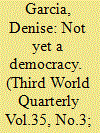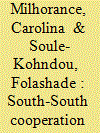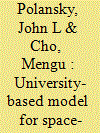| Srl | Item |
| 1 |
ID:
131383


|
|
|
|
|
| Publication |
2014.
|
| Summary/Abstract |
Brazil is considered one of the more successful examples of democratic transition and consolidation in the developing world; and one of the fastest developing and emerging countries. This article contends that Brazil is not yet a fully established democracy, because it lacks the proper civilian checks and balances ensuring full authority over the armed forces, police and secret services. There are five main reasons for this: first, the Constitution does not provide a generalised guide for the institution of civilian oversight. Second, a change of cultural perceptions vis-à-vis the security sector entities is needed. Third, piecemeal rather than holistic or comprehensive legal and institutional transformation has occurred, with little civilian oversight of the armed forces. Fourth, the large structures still held by each of the armed forces require re-articulation and fundamental transformation. Finally, there is no fully fledged civil society participation in security sector life through the media and academia. These problems weaken democracy in Brazil. The course of democratisation in Brazil and the role the security sector played in the transition are examined before discussion of some of the more recent legal and political developments in the security sector, as part of the democratic consolidation. The conclusion presents insights from Brazil's experience and lessons for states facing similar transition challenges.
|
|
|
|
|
|
|
|
|
|
|
|
|
|
|
|
| 2 |
ID:
154715


|
|
|
|
|
| Summary/Abstract |
Using the examples of the UN Development Programme and the UN Food and Agriculture Organization, this article aims to analyze how the role of international organizations (IOs) is being changed through the incorporation of South-South cooperation (SSC) narratives and practices into their activities. Despite increased interest in the role of SSC in global governance, few empirical researchers get inside these organizations to see and analyze how this form of cooperation impacts IOs and how the latter adapt to these changes. Based on fieldwork and participant observation, the article presents some results on the mechanisms of IOs in their efforts to permanently readapt to the international environment and, at the same time, participate in the configuration of the international scene. The main argument is that the revival of SSC by rising powers has offered them an opportunity to establish individual and collective strategic partnerships with IOs. In doing so, these powers used SSC modalities to engage several redirections of IOs' governance to lift SSC to the top of the international agenda. IOs first resisted these changes and then readapted by using these strategic partnerships as a means to reaffirm their role in the international system's hierarchy as main institutions promoting SSC.
|
|
|
|
|
|
|
|
|
|
|
|
|
|
|
|
| 3 |
ID:
147523


|
|
|
|
|
| Summary/Abstract |
Since 2011 the number of satellites less than 50 kg launched annually has increased by an order of magnitude. This trend is driven in part by proliferation of small satellite and lean satellite projects worldwide. In this decade alone, over 30 new countries are expected to achieve their first satellite in space. More than ever before, emerging countries are engaging in space-related activities. However, barriers such as lack of funding and underdeveloped human resources prevent many emerging nations from initiating or sustaining space programs. Kyushu Institute of Technology (Kyutech) has played an active role in space-related capacity building and international cooperation since 2009, then partnering with the United Nations Office for Outer Space Affairs to formulate a long-term fellowship programme hosted at Kyutech. Growing out of the success of the fellowship programme, Kyutech began significantly expanding its space-related capacity building project in 2013. This paper gives an overview of Kyutech's university-based model to enhance space-related capacity building and human resource development in emerging countries worldwide, and discusses advantages and disadvantages of alternative approaches.
|
|
|
|
|
|
|
|
|
|
|
|
|
|
|
|